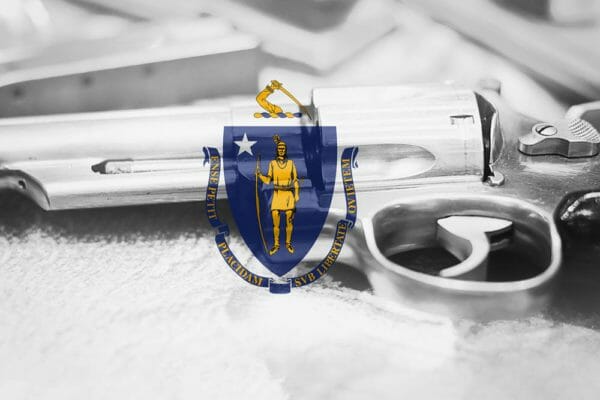
When Massachusetts Gov. Maura Healey signed an emergency enactment of the state’s new gun control law, she was trying to head off a petition drive that would have derailed the new restrictions at least until 2026, according to a report at Mass.live.
The result, however, according to Jim Wallace, executive director of the Massachusetts Gun Owners Action League (GOAL) has been “chaos.” He accused the governor of “once again silencing the voice of the people” by essentially heading off the petition campaign, mounted by a licensed firearms dealer and conducted by a small army of volunteers, which needed to gather at least 49,716 valid signatures from registered voters to put the new law on hold until it could be placed on the 2026 ballot, according to the Associated Press.
By telephone, Wallace told Ammoland that Healey moved fast when it looked like the petition had gathered far more signatures—perhaps several thousand—than necessary. The Boston Globe reported the petition drive had collected more than 65,000 signatures. Counting was to have begun shortly, with a town-by-town breakdown. The Democrat governor was not about to let that happen.
As explained by the AP story, Healey’s emergency enactment “cracks down on privately made, unserialized ‘ghost guns, criminalizes possession of bump stocks and trigger cranks and requires applicants for a gun license to complete live-fire training.” It also expands the state’s “red flag” law—also known as the extreme risk protective order (ERPO) law—authorizing people other than family members, such as health care professionals, to seek court intervention if someone is deemed to be a threat to themselves or others.
The AP report also acknowledged, “The action by Healey frustrates efforts by gun rights activists who had hoped to gather enough signatures to suspend the law before it took effect.”
GOAL has already filed a federal challenge to the licensing and training mandates. Wallace predicted it will take multiple legal actions, each challenging different sections of the law, to correct what he called an “insane” situation. He also predicted that if the law actually goes on the 2026 ballot, “the other side will spend millions to defeat us.”
Interestingly, the way Mass.Live writer John Micek portrays the fight is a “culture war battle” which many may have thought could not happen in such a politically “deep blue” state. Well, surprise, there are tens of thousands of angry, frustrated gun owners in the Bay State.
Indeed, there is much irony in the fact that the Revolutionary War began in Massachusetts with the Battles of Lexington and Concord in April 1775 over an attempt by the British to seize arms and munitions belonging to the militia.
According to Masslive.com, as of July there were 568,251 active firearms licenses in the Commonwealth, per data compiled by the Firearms Record Bureau. A number that large hints at the potential voter turnout if this measure winds up on a ballot.
In a message posted on the GOAL website, Wallace asserted that Healey, by signing H.4885 into law (Chapter 135 of the Acts of 2024), kept the final language of the bill secret “until the night before the legislature voted on it.” He called it “the worst attack on civil rights in modern U.S. history.”
He is hopeful the federal complaint already filed by GOAL will be taken up “immediately” and will result in an injunction against the law’s enforcement.
How this may play into the November election hasn’t been discussed, but it is clear to GOAL’s Wallace that Massachusetts gun owners are in a prickly mood.
“Massachusetts residents have no idea what to do,” he said. As things stand right now, “nonresidents cannot bring in any gun, period.” That’s not good news as the hunting season is getting underway. The commander of the State Police needs to approve a roster of acceptable firearms, he explained.
On top of everything else, Wallace said ammunition sales must also be recorded.
“It’s insane,” he lamented. “Right now, nonresidents are in danger. If they come into the state with a gun to hunt or compete, they’re a felon.”
If additional lawsuits are filed, it could bog things down if a court decides to issue an injunction against all or parts of the law.
Wallace calls the new law a “tantrum” against the U.S. Supreme Court’s ruling in New York State Rifle & Pistol Association v. Bruen in June 2022. That decision, adopted 6-3 and written by Justice Clarence Thomas, was viewed as a landmark change for the way lower courts and state and local governments must address Second Amendment issues. The ruling will have long-term effects on new and existing gun control laws, many of which are being challenged already by gun rights organizations such as GOAL, the Second Amendment Foundation, National Rifle Association, Gun Owners of America, California Rifle & Pistol Association, Firearms Policy Coalition and others.
About Dave Workman

from https://ift.tt/pc3Cfw9
via IFTTT

No comments:
Post a Comment